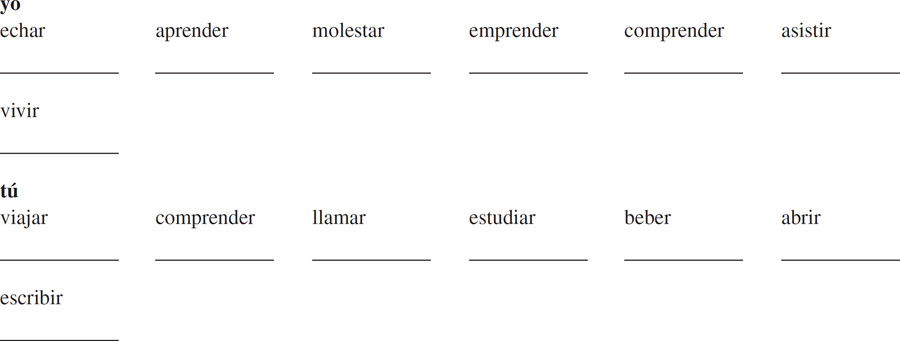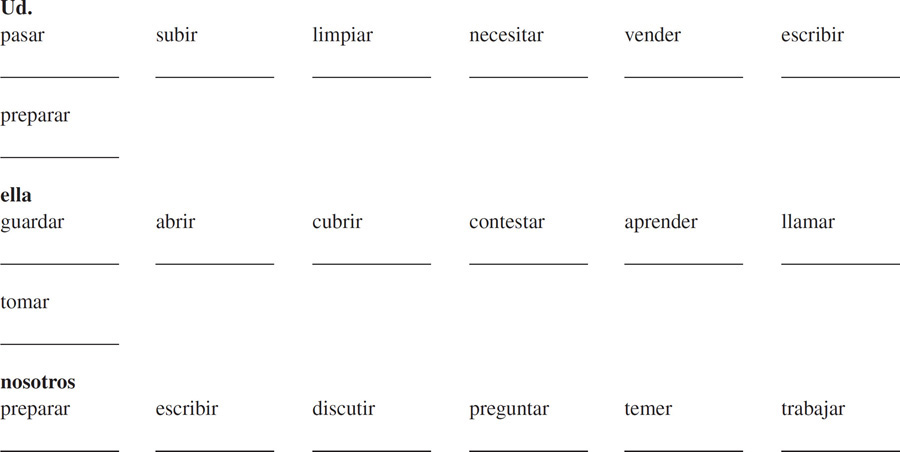
Present: The present subjunctive of regular verbs is formed in the same way as the present indicative, except that -ar verbs use the endings of -er verbs, and -er and -ir verbs use -ar endings. All endings are added to the stem.

Note: The present subjunctive may be used as a single clause following ¡Que… or ¡Ojalá que… to indicate a wish, blessing, or hope:
May you live in peace! ¡Que viva en paz!
I hope you live in peace! ¡Ojalá que viva en paz!
It is otherwise used in a clause that follows one of certain expressions in the present indicative tense, in which case it is always preceded by que. An example we will use here is Es posible que…

Write the present subjunctive form that corresponds to the subject indicated:


A. Change from present indicative to present subjunctive.
1. lleva _________________________
2. vive _________________________
3. escriben _________________________
4. trabajáis _________________________
5. leen _________________________
6. hablo _________________________
7. Ud. estudia _________________________
8. llamamos _________________________
9. viajas _________________________
10. abre _________________________
11. creemos _________________________
12. manda _________________________
13. escribes _________________________
14. tomamos _________________________
15. comprenden _________________________
16. como _________________________
17. vives _________________________
18. asisto _________________________
19. Ud. nota _________________________
20. caminan _________________________
21. mete _________________________
22. observáis _________________________
23. partís _________________________
24. andas _________________________
25. insistimos _________________________
B. Write the present subjunctive form of each verb, as indicated.
¡Ojalá que…!/¡Que…!
1. tú (comprender) _________________________
2. Ud. (leer) _________________________
3. yo (recibir) _________________________
4. Uds. (vender) _________________________
5. ella (comer) _________________________
Es posible que …
6. él (cantar) _________________________
7. yo (estudiar) _________________________
8. ellos (beber) _________________________
9. nosotros (tomar) _________________________
10. vosotros (vivir) _________________________
11. Ud. (enseñar) _________________________
12. ellas (correr) _________________________
A. Translate into Spanish:
1. It’s possible that she doesn’t understand _________________________
2. I hope you (s., fam) study _________________________
3. May we get _________________________
4. It’s possible that he lives _________________________
5. I hope they sell _________________________
6. May you (pl., for.) work _________________________
7. I hope you (pl., fam.) learn _________________________
8. It’s possible that we will teach _________________________
9. I hope she attends _________________________
10. It’s possible that you will receive _________________________
B. Translate into Spanish:
1. if he studies _________________________
2. I hope he studies _________________________
3. if he sells _________________________
4. I hope he doesn’t sell _________________________
5. if she learns _________________________
6. I hope she learns _________________________
7. if we live _________________________
8. I hope we live _________________________
9. if they attend _________________________
10. I hope they attend _________________________